The Glory of Spartacus
Let us break words on most glorious entertainment! When my ears first received tale of a television spectacle bearing the name of Spartacus, they did not stand to attention. “Meh”, was the only thought that sprang to mind, “gladiators, Romans, they have been so numerous on our screens in the past. Why bother…” The thought fell from mind and was not brought back to surface for many moons. But word from trusted friend left impression and action was taken. Familiar names among scribes accelerated process – Steven S. DeKnight and Jed Whedon of Whedonverse fame stand among them. Thus, shortly following arrival upon distant shores of the strange lands of Australia, screen was filled with gladiators to fill nights between feasts with friends and studying in solitude. But let us now end elevated words and set mind to purpose!
Earlier this year I answered a question I had asked myself many times: How can one fill the void that watching emotionally intense TV shows such as Buffy the Vampire Slayer and Doctor Who (nine and ten) leaves? My answer then was Babylon 5, another great masterpiece of television (and probably the first of its kind). So then what comes after Buffy the Vampire Slayer, Doctor Who and Babylon 5? Who could possibly deliver entertainment as mind-blowing and brilliant as Joss Whedon, Russell T. Davies and J. Michael Straczynski? And in the same breath, even surpass the cruelty of George R. R. Martin? Search no longer, for we have a victor: Steven S. DeKnight stands champion of tales that rip heart from chest. If you are familiar with the work of Joss Whedon, you may be familiar with the name Steven DeKnight – it can often be observed in the writing or producing credits of episodes of Buffy, Angel and Dollhouse. Steven DeKnight has written some of the more notable episodes of these shows – such as “Seeing Red” in season six of Buffy or “Shells” in season five of Angel. Not only is he a god of the scriptorium, he is also a man that is crazy passionate about his work and his fans. He is known to regularly answer fan questions on Twitter, often all but reinforcing his reputation as a mad yet brilliant bastard, as this answer suggests. I daresay the awesomeness of SDK even surpasses the awesomeness of Whedon, RTD and JMS – unlike them, his hand is given liberty to be at its absolute cruelest. While Buffy, Doctor Who and Babylon 5 were all to some degree daytime-television friendly, Spartacus is an absolute orgy of a bloodbath. It has all the cruelty we are familiar with from cable shows such as Game of Thrones, True Blood, The Sopranos, Rome and Six Feet Under and combines it with the instant rewatch quality of outstanding fan favourites such as the previously mentioned top three, Buffy, Doctor Who and Babylon 5. SDK, schooled in the ways of the Whedonverse and its fame for strong characters with intense development, takes this fan-loved style of television to Spartacus and embellishes it with authenticity ad absurdum: ridiculous amounts of blood, graphic violence, and an equal amount of nudity and sex. But sex and violence are not what makes the show brilliant. It’s all about characters.
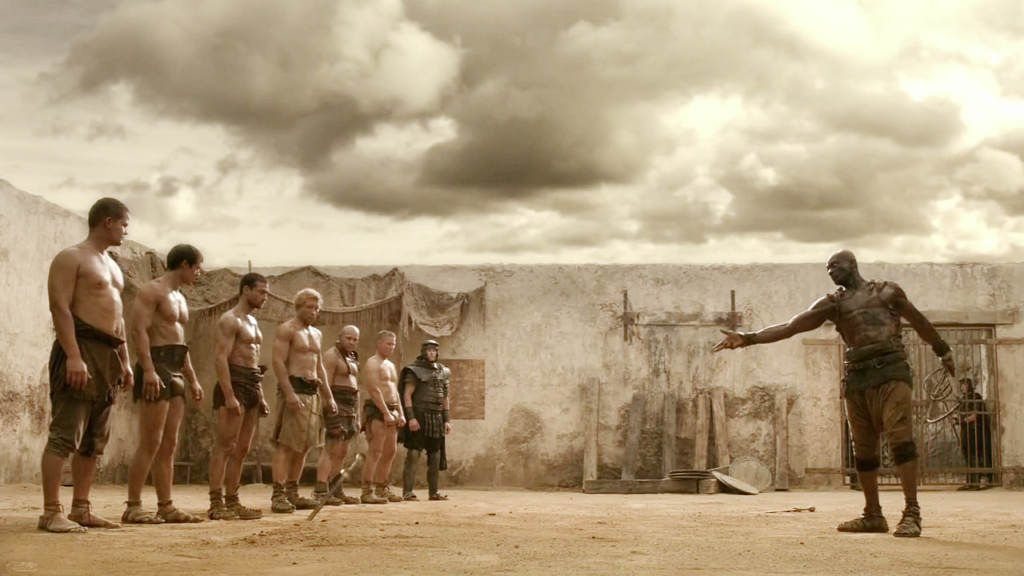
A show bearing the name of Spartacus does not seem to be an ensemble show at first glance. But it is – obviously Spartacus can not be the only character of a TV show – there are many more who stand as brothers upon the sands of the arena, or who force his will as his master. Spartacus shares a trait with a show that is the unlikeliest comparison: Downton Abbey. Similar to Downton Abbey, the characters are divided between “masters” and “slaves”, “upstairs” and “downstairs”, but still, almost every single character has a meticulously written character arc. There is no such thing as a one-dimensional character in this show – every good guy is deeply flawed, and every villain can steal a little bit of sympathy from you. Many of the villains do not even start out as such – they may appear as regular good or neutral characters, and for a while you might never know what their agenda is – are they good or bad?! But even if they unravel into the most malicious character of the show, you will be conflicted – on the one hand, you will wish them to die, but on the other hand you will want them to live because they are just so insanely awesome to watch. That one character who was introduced as a side note and never seemed important for a few episodes might easily become your favourite character of the show. I admit that some characters could have used a little more development, but that probably would have turned the show into a huge mess just like Game of Thrones, which in my opinion would be much better if they just removed 1/3 of the characters. Spartacus has just the right amount of characters to not be confusing and keeps the viewer enthralled. At the centre of it all is of course the one and only Spartacus.
Spartacus is introduced as a military leader hailing from the lands of Thrace (an area in present-day Bulgaria, Turkey and Greece). His tribe-thingy agrees to fight for the Romans against a common enemy, but when the Romans change their mind and want to move in the opposite direction, Spartacus and his men disagree. They have a fight and escape the Romans. However, Spartacus is later found and brought to Rome for execution, desertion his crime. Unexpectedly, he survives his own execution and is sold to a lanista to be trained as a gladiator. Thracians are apparently notoriously hard to train and impossible to control, but eventually Spartacus accepts his fate as a slave. Or does he? His emotional development throughout the first season is amazing. Naturally he remains the most important character throughout all seasons, standing as a god amongst his people. But there is one small problem this show had to deal with: the lead actor had to be replaced due to terminal illness.
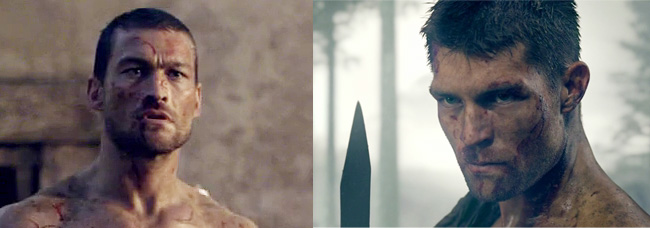
How can a show replace its lead actor (yet still be amazing)? The circumstances surrounding this are rather sad – Andy Whitfield, the lead actor who played Spartacus in season one (Blood and Sand), was diagnosed with cancer before the second season was due to start filming. In order to give him time to recover, the writers came up with a six episode prequel (Gods of the Arena) which provides us with a lot of background information on the important characters in season one and also introduces some awesome new characters, which then again resurface in season two (Vengeance). After completion of the prequel, Andy Whitfield seemed to have recovered from cancer and even made an appearance at Comic Con. However, a few months later a cancer relapse was discovered during a routine check-up and he had to drop out of the show. He gave the showrunners his blessings to recast the role of Spartacus and wanted the show to continue. Liam McIntyre was recast as Spartacus for season two and season three (War of the Damned), and sadly Andy Whitfield died from cancer a year after his relapse was discovered. I knew about Andy’s death and the fact that his role was recast for season two, and I think it’s important to know in order to emotionally prepare for this major change in the flow of the show. However, I still could not help to go through the five stages of grief while I was watching. First there was denial while I was watching Andy in season one: “How can this amazing and vivacious man be dead? I simply can’t believe it…”. Then there might have been a bit of anger as season two began, “THAT GUY?”, followed by a whole lot of bargaining, “Why did they cast HIM? He’s so… brutish!” and lame excuses “That voice is so deep!”. Eventually there was a bit of depression, followed by acceptance. Liam McIntyre really is the new Spartacus, and he made the role his own. This takes a lot of getting used to after having been so emotionally invested in Andy’s performance and the shock of his forced departure. But once you have accepted Liam, you’ll realize that he does an epic job.
While you are trying to get used to a new face in the lead role, you will probably discover a fondness for characters you never expected to grow fond of. Every character is brilliantly written and brought to live by an excellent actor. Most important among them stand Crixus (Manu Bennett), the troublesome yet undefeated Gaul, Naevia (interestingly also played by two actresses, which is hardly noticeable), who probably has the most drastic development of all characters, Ashur (Nick Tarabay), who is just plain fucking amazing to watch, Gannicus (Dustin Clare), a man without honour but with awesome hair, Agron (Dan Feuerriegel), a hothead who will go on to have the most romantic and heartbreaking relationship of the entire show, Batiatus (John Hannah), who struggles to fulfil the legacy of his ancestors, Lucretia (Lucy Lawless), who will do absolutely anything for the benefit of her husband, Oenemaus (Peter Mensah), all-in-one slave and slave driver, Ilithyia (Viva Bianca), spoiled Roman wife – or is she?, and even Glaber (Craig Parker) – no character ever gets boring to watch. Yet it is not only their development you may revel in, but also their attractiveness. No show has ever objectified men like Spartacus! Ovary explosion alert! Finally lots of eye candy for the ladies, since the average costume for men in this show consists only of panties. And sometimes they don’t even wear those! (Please not that if you prefer to look at naked women, you will equally enjoy watching Spartacus).

Despite being set in such a male-centered time period, Spartacus puts great effort into equality for everyone. This not only concerns the equal objectification of men and women, but also the equal awesomeness of characters regardless of gender – Naevia, Mira, Saxa, Lucretia and Ilithya are definitely among them. Old-fashioned people might describe them as “strong women”, but while that might still have been applicable in the late nineties when Buffy was released, that term should really be of the past. Some feminists still have problems with the depiction of women in Spartacus, but I think in a story set in ancient Rome, there’s only so much you can do. (I thought about adding a sentence about same-sex relationships here, but it seems rather old-fashioned, too. Why do I still have to point this stuff out?).
Though based largely on historical characters, SDK describes the show as “historically adjacent” rather than accurate. He uses the major historical events as signposts and imagines this grand and gripping universe of tragedy around it. The Romans, though certainly a favourite among many screenwriters, were a terrible people – their empire built on slavery and slaughter. They extinguished whole tribes throughout the realms of their empire, many of which are long forgotten. The fact that we know so much about Romans but so little of the great civilisations that fell under them is a result of literacy – while Romans had a strong written tradition, many other tribes did not. Spartacus is finally a show that does not glorify Romans, but rather depicts them as the abominations they really were. While they are convinced that they are “civilized”, it is the “savage” slaves that are morally and ethically superior to them. Advantage in numbers, communication and training helped the Romans to their famed position in history, but they were deeply capitalistic, their only interest being profit built on slave labour. Anyone who stood in their path was put to a gruesome death. It is a system of privileged few and disadvantaged masses, a pattern that can often be observed again and again throughout history. Though it is nowadays illegal to own people or kill them for disobedience, the majority of the population stands enslaved to serve the richest of the rich. Many are shackled to their minimum wage jobs, struggling to feed their families or even themselves. The one percent sit idly in their villas and are waited on by their servants without even having to lift a finger to have coin fall into their lap. Meanwhile, even the “middle class” falls victim to the greed of the rich, as they have their house and lands taken from them. It happened to Lucius in Spartacus, but it also happened to thousands of people in the housing crash in the US. Allegories to the US are manifold in this show – you could compare the Romans to the 1% and Spartacus and his rebels to the Occupy movement, or you could compare the Romans to the heavily armed US and the rebels to the Middle Eastern countries, or most obviously you could compare the Romans to plantation owners and the slaves to actual slaves. But you could also compare the Romans to any given Western civilization – and the rebels, former slaves brought to the Roman Republic from allover the place, to immigrants who come of their own free will, seeking better fortune. But as is obvious in any Western society, the majority of immigrants work in extremely poor positions for extremely low wages. They are the ones who serve you coffee at the coffee shop, but even more often they are the unseen ones who pick the fruit and vegetables which find their way onto our plates, in extreme heat, with extreme working hours. Even those “immigrants” who have been set free from bondage and might aspire to higher positions are never truly accepted as equals by society if they still bear the brand of their origins – be it a mark etched on skin as in Spartacus, or a foreign name, foreign accent or different skin color as in Western societies. Even today we can emotionally relate to the characters of Spartacus. Has the world really changed since Rome fell? Has it become even worse?
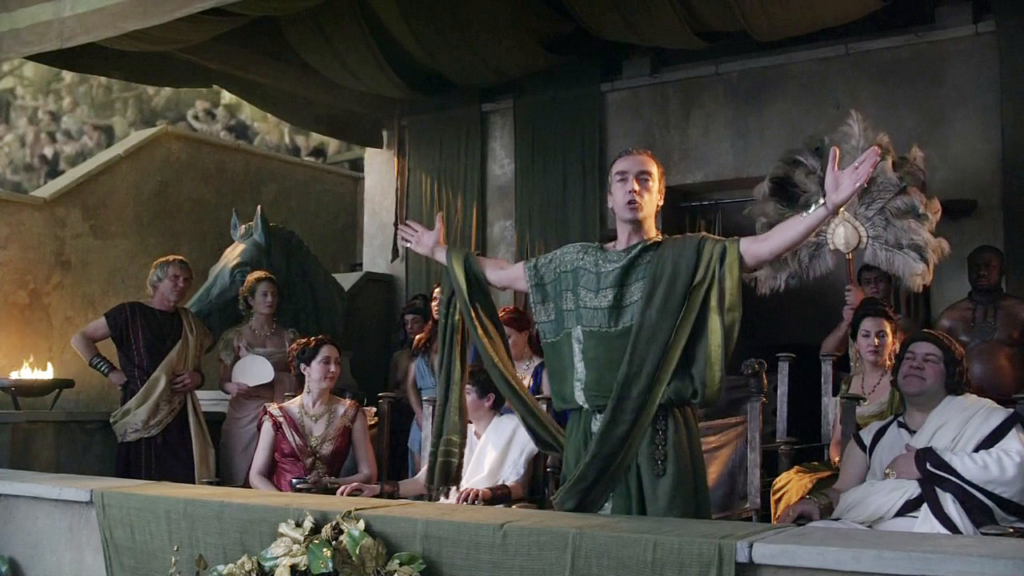
Spartacus is the prototypical communist. He demands freedom and equality for everyone and seizes opportunity to strike against those who would break his will under the cracking of a whip. He will not see human beings treated as animals and is joined in his cause by many who share his fate. Together they stand as an army to free those unjustly treated and make Rome tremble. He continues to outwit the Roman armies with his clever strategies, while they are gridlocked in their regulated tactics. He becomes an inspiring leader, but one who very much sets himself apart from the cruelty of the Romans. He gives everyone a chance to prove themselves and to speak their mind freely. He does not hold faith in gods and he does not favor his (individual) people holding coin which could instead be used to the benefit of all people. On the surface, freedom is a central topic of the show, which again is probably a very American theme. But it is ironic that underneath the mantle of freedom, Spartacus is probably one of the most communist characters on a TV show I have witnessed – in an American TV show. Yet Spartacus is a much nobler communist than all those who followed, as he is the one who fights the corruption, not the corrupted one himself. Spartacus is a classic story of rebellion against a corrupt government, something many governments in our time are in dire need of. This is just one of many interpretations you could draw out of this show. I have barely scratched the surface of what it has to offer content-wise. It has plenty of profoundness yet it is always entertaining. (I could go in depth about so many other topics, but for the sake of avoiding spoilers, I will continue to ramble about some of the awesomeness this show has to offer on the surface.)
Another dimension that adds to the historical adjacency of Spartacus is the use of language. As you, gentle reader, might have inferred from the introductory paragraph of this humble ramble, Spartacus has its very own lingo. This we also owe to the awesomeness of our knight Steven, who draws from his past as a Shakespeare scholar. His purpose was to actually use proper Shakespeare English for the show, but when even his own writers did not grasp his words, foot was set on middle path. For me as linguist, this particular language makes listening to this show all the more interesting. I feel the need to write a term paper on sentence constructions and influence of Early Modern English on Spartacus. Though such elevated words are prevalent throughout the show, they never distract from the plot. Language is really well balanced, as is everything in this show. I merely have a small problem with the use of badly pronounced Modern German in season two and three because I really think they should have used Proto-Germanic, but I guess if they had done that, they would have had to shoot the entire thing in Latin.
While ears feast on prestigious register, eyes are overwhelmed with stunning visuals. Eyecandy is not limited to attractive gladiators – it also takes hold in the visual effects. The entire show was shot in a studio on green screens, with skies and environments added digitally. Admittedly this is somewhat noticeable in the first season, but it improves over time and never causes much distraction as we revel in the treachery of the plots. Many of the fight scenes make use of stunning slow-motion effects which allow us to see even a single drop of blood as it flies through the air. The producers initially aimed for a “visual graphic novel” style for this show, which is very obvious in the first few episodes. However, use of this style decreases throughout the show and becomes more subtle, yet it is still noticeable in the ridiculous blood splatter in every fight scene. Though this makes everything seem a bit artificial, it makes it also easier to watch. More realism would be way too disgusting (like Hannibal?).
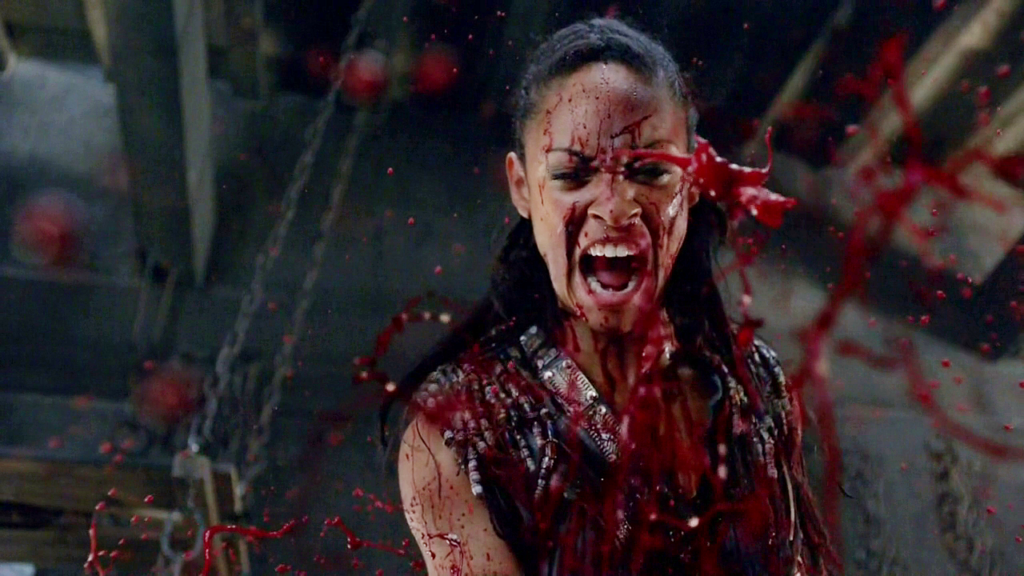
Spartacus is most certainly a feast for the senses – and for the heart. Not since Buffy and the tenth Doctor have I been so emotionally invested in fictional characters. I presume that Spartacus also functions as an emotional outlet for me while I’m in Australia – awaiting the arrival of my boyfriend while simultaneously having had to deal with a horrible housemate situation. If you find yourself in a similar situation, here is your therapy.
It is rather interesting that I would find myself watching this show while in Australia, as it has a close connection to this country. Though written and produced mostly by Americans, it was filmed in New Zealand. Australia’s proximity to New Zealand has lend the show many talents from its shores; among them lead actors Andy Whitfield and Liam McIntyre. Many of the supporting roles are also played by Aussie actors, but of course there is a more or less equal amount of Kiwi actors, most famously the amazing Lucy Lawless. A small minority hails from other places, such as John Hannah from Scotland and very few from the US. Similar to having watched (the much inferior) Farscape, watching Spartacus has been insightful for me while I’m getting to know Australia and Australians. Spartacus has introduced me to several Aussies and Kiwis which I will definitely watch out for in past and future productions. Having previously seen Arrow, I was rather surprised to see Manu Bennett in Spartacus and consequently finding out that he is actually (part) Aussie, as suggested in Arrow (though also, and probably more importantly, part Kiwi/Maori). Incidentally, he and a lot of other people involved in Spartacus have previously worked on Xena: Warrior Princess (one of the few shows I haven’t seen).
Spartacus has instant rewatch quality. Hardly ever have I wanted to rewatch a TV show immediately after finishing it; so far, this has only happened after I watched Buffy for the very first time. Eyes still wet with tears from the events of the final episode of Spartacus, I set out and started from the beginning. And it is every bit as exciting and intoxicating as during my first watch; the show is so dense that it never gets boring. Unlike in the case of Buffy or Babylon 5 you will not have to sit through 1-3 seasons of terribly slow season arcs littered with boring filler-episodes. Spartacus is gripping from the very first episode and moves the plot forward quickly yet subtly. Every episode is spot-on. Steven DeKnight has done his job to perfection, and I cannot wait for his next project to finally go into production.
The fact that I have just written a ~3500 word (somewhat) spoiler-free review full of nothing but praise speaks for itself. For the first time in my life as a TV show addict, I genuinely feel like I don’t need to ever watch another show again. Why bother watching episodes of something way inferior when I can just immerse myself in Spartacus?! I want to bathe in the awesomeness of this show: stunning slow motion, ridiculously graphic violence, gorgeously muscular half-naked men, heartbreaking love, mesmerizing profoundness, venomous villainy, words that are a feast for the ears, haunting music, sneaky foreshadowing, mind-blowing plot-twists, tearful conclusions… all I can say is: ALL MY FEELS.

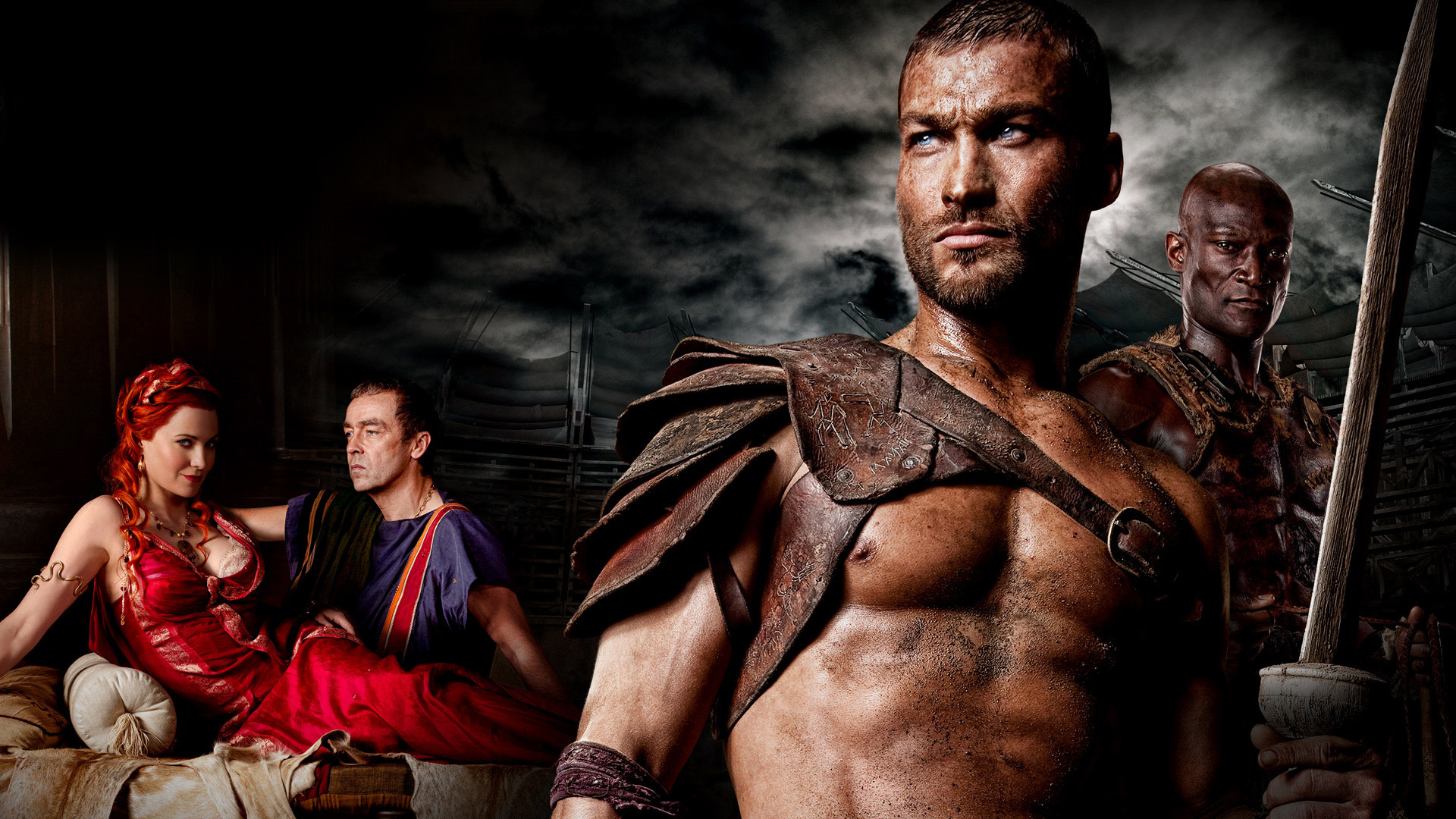
This review appears to be Steven DeKnight approved.